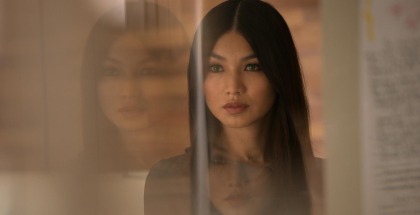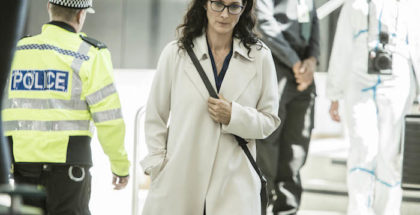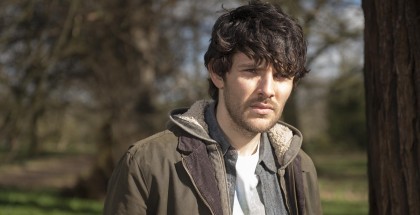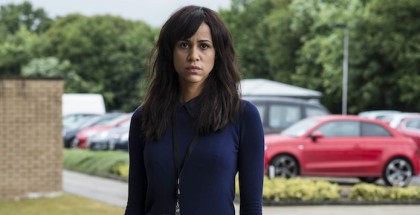UK TV review: Humans Season 2, Episode 4
Review Overview
Truth
8Perception
8David Farnor | On 24, Nov 2016
Warning: This contains spoilers.
Closer to humans than ever before. That was the tagline used by Channel 4 to promote its sci-fi series – a phrase that carries a veiled threat, not just in terms of its synths’ similarity to us, but in terms of their physical and emotional proximity. Because of the way humans trust them, they’re in people’s homes, workplaces, bedrooms. It’s no wonder, then, that while synths want to, in a way, be more like humans, some humans also want to be synths.
Sophie Hawkins is the main culprit, as she continues to act like she’s Mia, responding to everything as politely and calmly as possible, still calling her dad “Joe”. Laura and Joe’s decision to call in a shrink gives us one of the most revealing observations in the show to date. “They are perfect, kind, gentle versions of adults,” he tells her parents, smiling. “Boundaries have been blurred.” (We’ll say: have you seen what’s going on with Ed and Mia right now?)
His advice is for her to interact with more humans – but he’s picked the wrong house for that to happen, as Odi inevitably turns up minutes later, teaching her how to fold laundry. And he really does have a kind, gentle side, even though he’s broken and knows it.
At the same time, we spend more time with Renie at the local school, who is acting like a synth without us really knowing why. Toby, of course, is smitten, something that says a lot about his formative experience fancying Mia in Season 1. After getting shot down by her over lunch last episode, here, he succeeds in inviting her over for maths homework, that most human of all dating pretexts. He’s as fascinated with her bizarre behaviour as we are; is she actually a synth after all? She certainly has the bizarre contact lenses for it. As the psychiatrist says, boundaries have blurred – boundaries that blur even more, when Toby manages to get Renie to laugh, only for her to catch herself halfway through.
After several episodes setting up the main thrust of Season 2, the result is a slower chapter that emerges as an interesting study of how humans perceive synths and what they project onto them. In the case of Mia, who gets closer to her human Ed than ever before, does he genuinely like her? Or does he just see her as another way to improve his loan credentials and keep his mother in a care home?
“You’d need to pretend to be my owner,” says Mia, when he suggests taking her to see his mum, a reminder of not just how precious their relationship is, but also how easy it is for the perception between them to be distorted. Her visit sees her work the same charm with Ed’s fading mum – Mia’s not just closer to human, but better than humans in many ways. But that value is something it’s easy to imagine Ed taking literally, rather than emotionally; he could just switch her off and sell her for a high price. And oh, look, Athena Morrow and Milo happen to be looking for some conscious synths for their work.
Our other inter-species bond remains the lovely Pete and Karen, but their relationship is swiftly becoming part of Season 2’s over-arching plot, as they continue to trace the black market “Seraphim” synths. Pete, of course, thinks of them as a way of making sure Karen doesn’t have to hide from society, but he still doesn’t think of Karen as connected in a logical, police-like way, not even as a lead to investigate – like Mia, perhaps, he’s blinded by affection. But still, their findings (and Pete’s beating at the hands of the thugs he encounters) only raise the big question: if they’re not the conscious synths, such as Mia and Niska, what exactly are they?
The focus, otherwise, remains on Niska, whose quest to be recognised legally as conscious continues behind closed doors. Laura, after discovering Astrid’s phone number in Niska’s jeans, brings her in to try and provoke a reaction – and once again, it’s fascinating how much that reveals about the way humans relate to synths, rather than the other way around. Their reunion is moving, but not for the reasons we expect; Niska remains blank and cold, while Astrid is initially shocked to realise Niska isn’t a real person. She couldn’t tell Niska was a synth, she even decides that she still likes Niska regardless, that her synth nature doesn’t matter – but all of that, however, isn’t proof enough to get her a trial. It’s a telling divide between science and sentiment; how much more proof do you need of consciousness than its ability to form meaningful relationships with humans? Or is that just a sign of how much we project our own image of consciousness onto the inanimate objects around us? (Humans, despite its lack of guns and cowboy hats, remains a fantastic low-key companion piece to HBO’s Westworld.)
The Hawkins, there’s no question, see robots as a threat, to some degree, and not because their youngest daughter and son seem in love with the idea of them. Joe discovers at work that his firing wasn’t even done by a human, but decided automatically by a synth; a string of emails that, oops, just forgot to ‘cc’ in a human. “This is how we’ll lose,” he rails at his former boss. “Not robots rising up to slaughter us in our beds. It’ll be machines sending silent messages in the middle of the night.” Laura, meanwhile, is literally threatened by one, as a synth attacks the family in their home insisting that she drop Niska’s case.
Elsewhere, in Leo Land (the one strand of the show that needs to catch up with the briskly moving other parts), Colin Morgan’s half-synth gets increasingly frustrated with Max, who continues to represent the moral, human side of every argument – Leo has, we realise, grown tired of what he perceives to be a two-dimensional good angel sitting on his proverbial shoulder, so he sends him away to stop his mission being held back. But what is his mission? Does he even know?
Amid all the shifting perceptions of synths by our humans, Episode 4’s most intriguing battle of POVs comes when Athena is invited to dinner by Milo. Both are creatures of deceptive appearances – she lies to conceal the computer-crafted consciousness of her dead daughter, while he pretends to be and know everything. (“I’m not a wine person,” he admits, after ordering what he hopes will be a good bottle. “This one’s expensive.”) But they also see through each other’s false surfaces; he, with his full access to her computer, quickly works out what she’s up to, while she sees through his childhood sob story and gets right at the heart of what his plans are, rather than who he is. She demands conscious synths, like David Elster’s children, to successfully manage consciousness transference, which he seems happy to provide – is that what he meant when talking of something “pure” in his synth work? The idea of being able to transfer consciousness and, in doing so, cheat death? In an episode where we see how much humans can misread or misunderstand synths, here are two humans who can perceive each other clearly. And they’re most dangerous of all.
Humans Season 2 is available now on DVD and Blu-ray. You can also stream it for free on All 4, or buy and download it on pay-per-view VOD, including iTunes, Amazon Instant Video and Google Play.






















